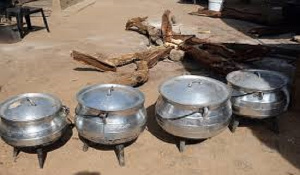Researchers have cautioned that the use of cookware made from recycled aluminium, results in lead poisoning, and other harmful health effects, such as stroke and cardiovascular diseases, including heart attacks in Ghana.
Their findings indicate alarming levels of lead and other metal exposures from cookware, popularly known as aluminium cooking pot or ‘dadesen,’ in Ghana.
A statement issued by Occupational Knowledge International (OK International), a non-profit environmental organization, based in San Francisco, copied the Ghanaian Times, said the study “Metal exposures from source materials for artisanal aluminum cookware,” published in the International Journal of Environmental Health Research, simulated cooking with palm oil and acidic foods.
The report said the average level of lead found in the equivalent of a single serving of food cooked in the mixed metal cookware tested is 36 times greater than the United States (U.S.) Food and Drug Administration (FDA) guidance for daily lead intake.
Similar cookware is widely used throughout the developing world and is available for purchase on commercial websites.
Blood lead levels have decreased following the removal of lead from gasoline in most of the world, but remain elevated in many low and middle-income countries around the world in comparison to the US and European Union.
A recent study in Ghana showed that 65 percent of blood donors had elevated blood lead levels greater than 5 µg/dl.
Jeff Weidenhamer, Professor of Chemistry at Ashland University, US, and first author of the article, said: “That this investigation suggests that regular use of this type of aluminum cookware is causing harmful lead exposures in Ghana and other countries. Lead poisoning from cookware can impact entire families over a lifetime.”
The authors investigated if segregating and avoiding certain source materials could reduce the leaching of lead and other hazardous metals from locally made cookware.
They concluded that all of the cookware made from seven separate waste streams typically used for this purpose released harmful concentrations of lead, cadmium, chromium and other metals.
There are no regulatory standards for lead in cookware, but the World Health Organisation (WHO) and the U.S. Centers for Disease Control have determined that there is no safe level of exposure to lead.
Perry Gottesfeld, Executive Director of OK International, and an author of the article said “Greater awareness of this hazard is needed in African and Asian countries where recycled aluminium cookware is commonly used. Public health authorities must inform the public that daily use of these pots can result in lead poisoning and other harmful health effects and that safer alternatives are available.”
Muntaka Chasant, an author of the article, who has documented the local metal recycling process, said that “informal sector metal workers are highly exposed to these same metals during the production process.”
At low levels, lead can damage the brain and result in lower school performance and behavioural problems among children and is associated with lower earnings later in life. Several studies have also linked childhood lead exposures to future criminal and violent behaviour.
In addition to the well-established harmful neurological effects of lead exposure for both children and adults, lead and cadmium are significant risk factors for heart attacks and strokes. Cardiovascular disease is the leading cause of death around the world.
Source: ghanaiantimes.com.gh
 Home Of Ghana News Ghana News, Entertainment And More
Home Of Ghana News Ghana News, Entertainment And More





